Returning to a World-Accepting Religiosity
The birth and death of dualism; the horseshoe of primitive religion and the religion to come
Civilization is an organism - morphing, living, dying, reproducing - it adapts to the context and setting in which it finds itself. Above all else, they undergo a process of evolution that leads to increasingly differentiated forms. Though we can see civilizations of morphological similarity to Rome, like bulls to the auroch, Rome truly only exists in the fossil record - never to live again. Its offspring now walk the Earth, carrying on the faint vestiges of a ghost.
Religion, serving as one of the fundamental organ systems of the organism, should be seen as no different and, in fact, inclusive and integral to the actions of the organism.
In modern science, it’s possible to predict the near-future evolutionary trajectory of genes and organisms by looking at its current and previous states. By analyzing these factors belonging to our contemporary and ancestral religions, we can forecast where religious attitudes are heading. In doing so, I find that we are horseshoeing in a sort of near-convergence back to the world-accepting religions of the past.
World-Accepting vs. World-Rejecting
Robert Bellah put forward a chronology of this mechanism in his 1964 article Religious Evolution, in which he points to 5 stages in the evolution of religion from man’s primordial origins to modern religious attitudes:
Now, for heuristic purposes at least, it is also useful to assume a series of stages which may be regarded as relatively stable crystallizations of roughly the same order of complexity along a number of different dimensions. I shall use five stages which, for want of better terminology, I shall call primitive, archaic, historic, early modern and modern. These stages are ideal types derived from a theoretical formulation of the most generally observable historical regularities; they are meant to have a temporal reference but only in a very general sense. (Bellah, ibid.)
Essential to Bellah’s theory and the division of these 5 stages is the dialectic between world-accepting and world-rejecting religiosity.
World-accepting religions can be typified as monistic, animistic, and oriented towards a singular, cyclical cosmos. I have heard this type of worldview explained as a type of “child-like wonder” and fascination with the world, with little attempt to explain it, but only to participate. Anthropologist Lucien Lévy-Bruhl termed this worldview, in particular to the animistic religion of the Aboriginals, as “le monde mythique”, the mythical world or “the Dreaming”. World-accepting religious systems are inherently ingrained into the daily life of ethnic and political systems, so much so that they can hardly be considered as distinctly “religious” activities. And though there are many afterlives in these religions, these typically refer to an ambiguous and ethereal condition which ultimately cycle right back to the world. Examples include shamanism, Shintoism, and Indo-European paganism.
World-rejecting religions are largely the former’s inverse. They are above all else dualistic, referring to (as the term suggests) a mundane and evil worldly existence that must be escaped and transcended in favor of a divine condition that is concretely separated from the world. There exists an extremely negative perception of man and his condition in society and in the world, and a negative perception of the principles of nature. With dualistic religions also came cosmopolitan and monotheistic religions, which allow any human individual to strive to the same ultimate existence. Not only is worldly existence finite, existence in some other divine realm is the only eternal existence possible. Though Abrahamic faiths are an obvious example of this system, it is not alone - Buddhism particularly exemplifies this worldview, and its origination for the West is not found in the Levant, but in Greek Platonism.

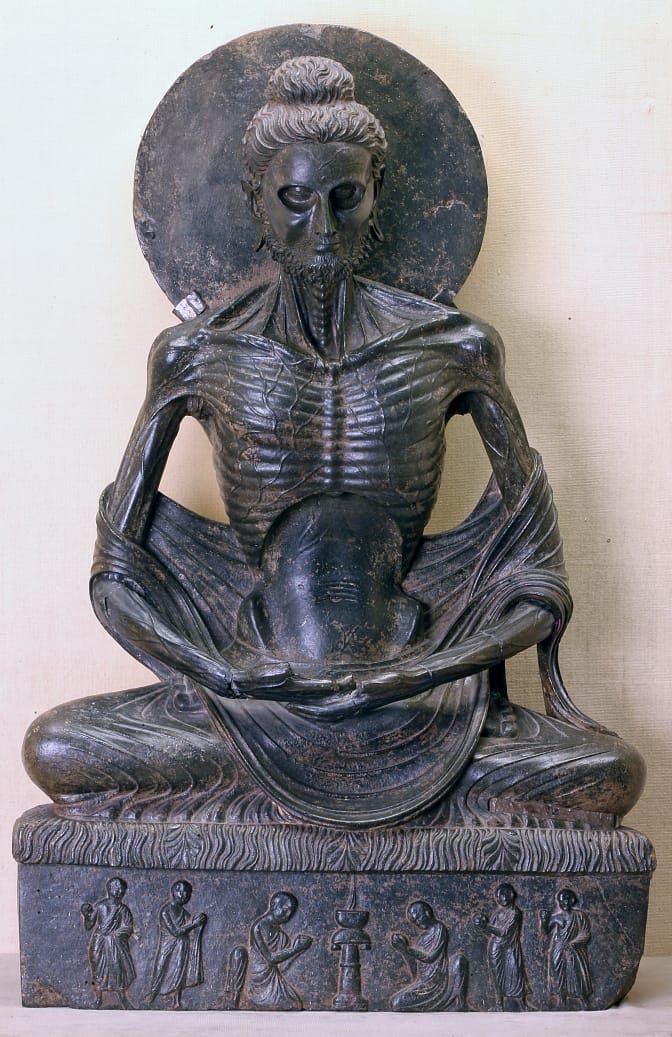
For Bellah, it is clear that primitive man starts with the religious symbols of a world-accepting religiosity. Over time, the differentiation and adaption to man’s environment - the evolution - of these religious symbols leads to the development of world-rejecting religiosity. And finally, with the Protestant Reformation and development of modern religious attitudes, world-rejecting dualism suffers a decline which prompts a return to world-accepting monism.
With the mechanism of the evolution set, the chronology is a bit easier to parse.
The 5 Stages of Religious Evolution
Primitive Religion
The religion of the hunter gatherers and Paleo-Mesolithic; and since it is the first in our phylogeny, it is also the simplest and least differentiated. Every river, mountain, bloodline, and beast is described in a mythical context. Rituals are defined not by sacrifice or prayer to a God, but by a type of personal participation, in which the participant becomes the divine entity. Religious structure and class is entirely absent. The world is fully divine, and there is nothing but the fully-divine world.
Archaic Religion (“Paganism”)
Ancient Greece & Rome, the Indo-European faiths, Shintoism. With the emergence of cults towards complex gods, ritual, prayer, and sacerdotal systems are developed. Gods are either anthropomorphized realities of the world, or otherwise associated with it. Primitive forms of dualism are developed, with the concepts of apotheosis and kleos serving as ways to transcend worldly existence, and the realm of the Gods being seen as a distinctly different type of existence. Although, the world is not yet formally rejected as finite and evil, as the Gods take their own personal interest in the world, fighting over men, causing wars, and directing nature itself. This can be seen in both the Old Testament and the Iliad.

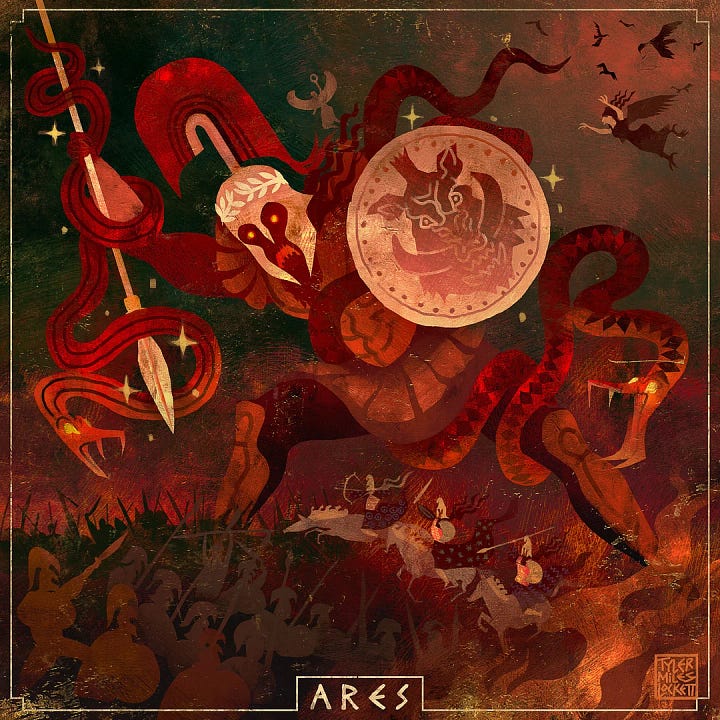
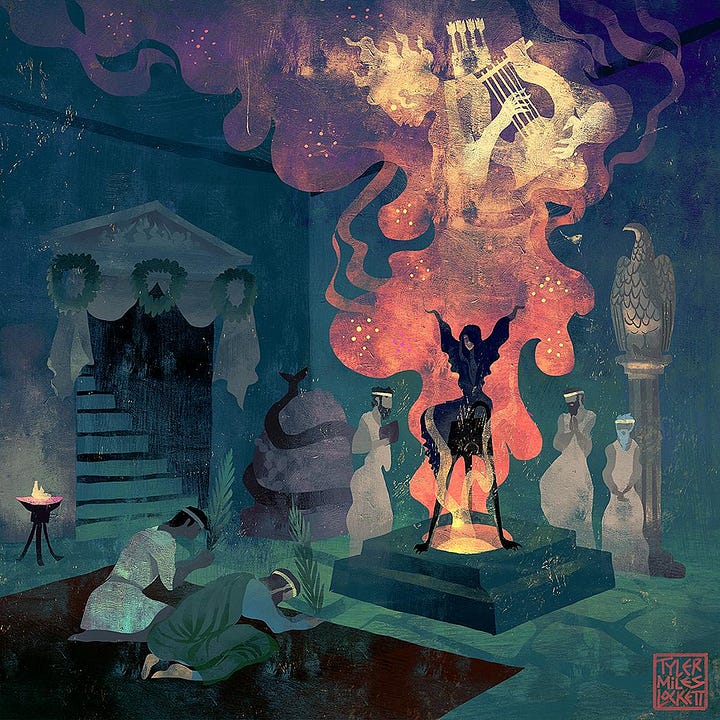
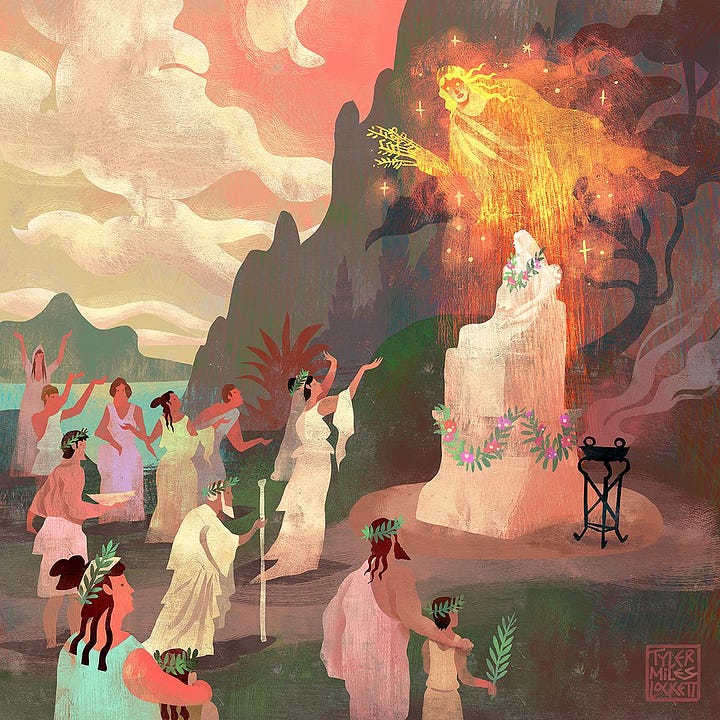
Historic Religion
Platonism & Gnosticism, Scholastic Christianity, Buddhism. These religious systems are plainly dualistic, in which the world is flatly rejected as a place of evil and suffering. Man, too, is an inherently evil thing which must be purified. The only meaningful type of existence is beyond and far away from this world, where God or some other sort of “ultimate/final” existence lies. The primary responsibility of its adherents is to minimize and escape suffering through ascetic acts. The world is demythologized: no longer is nature a concern, no longer do Gods play games with the world. There is but one God, and he is not here. When we die, we must ensure that we never see anything like this wicked and degenerate world again.
With this evolution comes a remarkable event of religious organization - the formation of world religions and their institutions. The Church not only serves as political player, such as the crown of the Holy Roman Emperors being placed on their heads by the chief representative of God on Earth, but it also serves as the sole bridge between man and God, extra Ecclesiam nulla salus. The tall, vaulted ceilings and domes of Europe symbolize and imitate the vast chasm between man and God, the infinity of the heavens.
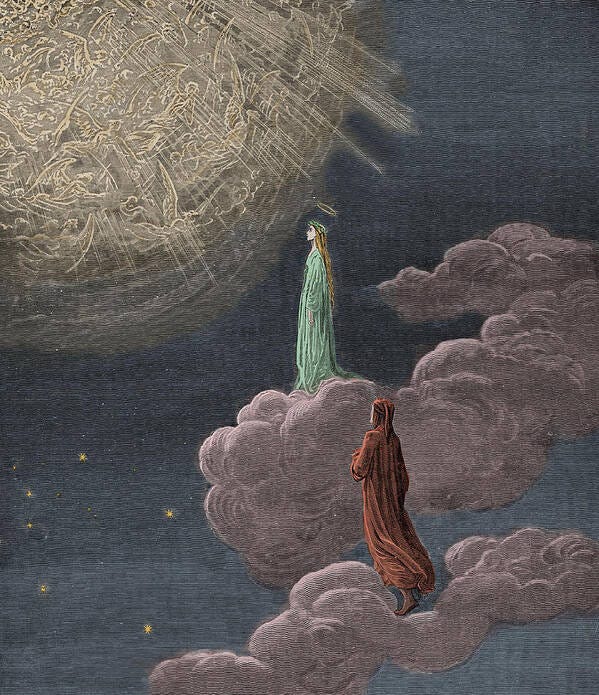

Early-Modern Religion
A number of things occurred during the pike-and-shot era of Europe that struck tremendous blows to the Historical religions, particularly in the West. The development of rationalism, the scientific method, humanism, the Renaissance romanticization of Archaic religions, but above all else: the Protestant Reformation.
The Protestants reformed and/or abolished numerous things within Western religion that were typified under the Historical religious system. The grandiose sacerdotal institutions, such as the Catholic Church, were no longer mediatory between man and God. God became accessible to all without any roadblocks, and as such religious hierarchies were abandoned. In addition, the Reformation greatly differentiated the Christian West: aside from tearing Europe to pieces, the number of Protestant sects today is quite literally unquantifiable, with some guesses ranging up to 47,000. And though dualism remained firmly in place, we see the removal of religious institutions in favor of more individualized religions that claim a direct communion with God without any intercession. Protestantism placed great importance on the ability for one to think for himself and a critical analysis of dogma. This would have profound effects on religion and its progression to the next stage.
Modern Religion
The secular developments of the Early Modern (rationalism, humanism, etc.) continued to the modern day, and has arguably created the latest step in religious evolution. Modern religion refers to both concurrent religiosity and the religious attitudes to come.
Firstly, there is the highly individualized nature of modern religion. Every man has his own religion, or as Thomas Paine stated, “My mind is my church." It is incredibly common for modern people to not ascribe to a concrete, institutionalized faith; but rather combine aspects of other religions or innovate their own entirely as part of an intellectual pursuit. I myself am no exception. There is an ongoing effort to revive archaic and primitive religions, however the fact that both of these are concurrent highlights the individualized nature of modern religions. Everything exists at once in a mass plurality.
Secondly, dualism is, for all intents and purposes, dead. Concepts like the fallen nature of man/society, original sin, and even the need for salvation are increasingly abandoned. Instead, we witness a dramatic popularization of religious attitudes and intellectual claims that prioritize or outright divinize nature: neopaganism, pantheism, evolutionary science, ecological activism. Simply put, today’s people are much more comfortable lauding the goods of the world than decrying it as evil and trying to escape it.
Finally, the relativistic tendencies of modern religion orient people not to one reality as in primitive religions, but to an infinitude. Popular ideas such as multiverse theory and science fiction (and reality) have shifted our religious orientation away from all of man and one God to each individual facing an infinitude of realities.


Reinventing the Wheel: World-Accepting Religiosity
An analysis of previous “organisms” in our phylogenetic tree of evolution shows a gradual trajectory from an orientation to a singular cosmos to a highly individualized nature of religion, in which an infinitude of religious values are possible. So where is the horseshoe?
What modern religion has brought, through the midst and pandemonium of the collapse of Christianity, is a confident return to world-accepting religiosity. Concepts like dualism, monotheism, original sin - even sin itself, have increasingly soured. Crucially, modern people are no longer concerned with escaping the world, but with figuring out how to orient themselves within it. Ironically for Christianity, it was developments within its own worldview that ultimately led to this form of religiosity.
However much the development of Western Christianity may have led up to and in a sense created the modern religious situation, it just as obviously is no longer in control of it. Not only has any obligation of doctrinal orthodoxy been abandoned by the leading edge of modern culture, but every fixed position has become open to question in the process of making sense out of man and his situation. (Bellah, ibid.)
With the death of dualism and all other antecedents of world-rejecting religiosity, modern religious values have reoriented themselves upon a world-accepting foundation. The list of examples for this is endless - neopaganism/wicca, green movements, the Wandervogel, the Positive Christianity and paganism of the SS, intellectual deism, pantheism, cyclical and multiverse theories of the universe - on and on. The point of this is that there is once again a fascination with man’s place in the world and the need to develop religious systems which can adapt to that worldview.
Though we can expect religions to continue to differentiate, we can also expect them to fit the framework of world-accepting religiosity. We may have a billion different reasons to worship the rising Sun, but worshipped it will be.
The Religion to Come
Though there are a few fundamental differences between primitive/archaic religion and modern religion, namely its orientation to one cosmos vs an infinitude, it is clear to me that these differences are rather miniscule in comparison to the historical religions of Buddhism and the Abrahamic faiths.
The need for a savior or ascetic acts is pointless in a worldview where the world is not only accepted, but celebrated. You can already see this in some Christian attitudes where many believe that God doesn’t really send anyone to Hell, and that eventually everyone gets in. Even God himself has reoriented towards humanism, right as Christianity fights to prevent itself from drowning in it. And while the rise of concepts such as Darwinism have completely routed the Abrahamic conception of life, they have only emboldened religious systems that elevate nature to a status of authority; and not merely a pot of evil for man to boil in.
But a horseshoe is not quite a circle. In the context of paganism, which endeavors to revive the archaic religions for exactly what they were, it must face the challenge of religious differentiation. A model of a religion for every man is not what the Indo-Europeans practiced. The establishment of true public paganism will run into a problem of differentiation, where it must not sway whole groups of people from their faiths, but each individual person from their idea of reality. And more challenging, it must find a way to keep them together during a time where adherence to religious dogma is flatly rejected.
Evolution is not fatalistic. It contains no set course or destiny, all it states is that organisms adapt to their environment, or, they die out. Dramatic changes to environment spur dramatic changes to morphology. Perhaps one such dramatic change humanity could find itself in is an artificial environment it has created where religious organization is nonexistent, and the longing for the benefits of the inverse creates a 6th step in religious evolution. Perhaps religions will focus on orthopraxy over orthodoxy. Perhaps religious values become so atomized that they are functionally nonexistent. At this point, it’s just speculation.
But I can use this framework to make the argument that the contemporary West has grown tired of the dualistic nature of its former faith, and has begun to make changes. Revivals of primitive and archaic faiths have exploded as world-accepting religiosity has become the norm, though they have yet to find themselves and be considered truly “established”. Abrahamism has yet to decide if it desires to adapt, as in the form of Vatican 2 or blessing Pachamama idols, or double down to retain its traditionalist factions.
All of this, remains to be seen. The only constant is change.
Further Reading
PDF of Bellah’s article Religious Evolution
Primitive Mythology: The Mythic World of the Australian and Papuan Natives. Levy-Bruhl. A short article on Bruhl.
Old and New Paganism, BAP. Interestingly, he advocates for something closer to primitive religion as opposed to attempting to recreate archaic religion.









Once again, I just cannot have such optimism. I think we are not entering a resurgence of life affirmation, but instead we are reaching a new state of decadence — fully materialistic life denial. People are now seeking to escape the troubles of the material world through an increasing reliance on material, rather than some sort of asceticism or heroic action. The dopamine chambers. The Dyson spheres. This is exactly what Heidegger feared about technology, that people would use it to run away from the world rather than to achieve power in the world, which subsequently will turn human beings reliant on technology rather than the vice versa.
I would say that the life-denying attributes of Platonism are more of a late influence, the notion of “henosis” was introduced by Plotinus who was probably the most life-denying of the Neoplatonists. Middle Platonists and early Platonists were only really interested in demonstrating the underlying oneness of reality, they were less concerned with some sort of soteriology and it was generally agreed that the world was worth living in and that goodness had much more sway over the world than evil. Later more mystical platonists agreed with the goodness of the world, but also viewed enlightenment as the best possible good and sort of a form of apotheosis more than self-immolation. The Dharmic equivalent of this is probably Vishishtadvaita. It still recognizes underlying unity but enlightenment merely brings one close to God (Vaikuntha) while still having a separate being.
I would say Gnosticism is in sort of a league of its own. Christianity is kind of life denying but more in its praxis, with the whole martyrdom schtick. Christians do still believe, after all, that the best end to history is a reincarnation of human beings — that being with a body is better than being without a body